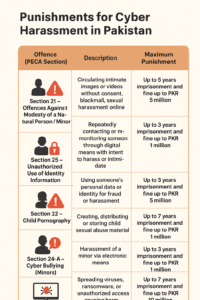Cyber harassment legal help Pakistan
Cyber harassment has become one of the fastest-growing digital crimes in Pakistan, affecting students, professionals, entrepreneurs, and public figures alike. From threatening emails to malicious social-media campaigns, online abuse can destroy reputations and mental health within hours. Recognizing the seriousness of this threat, Pakistan enacted the Prevention of Electronic Crimes Act (PECA) 2016, empowering the Federal Investigation Agency (FIA) Cyber Crime Wing to investigate and prosecute offenders. Yet many victims remain unsure of their rights or fear public exposure. Understanding the legal process, collecting evidence, and seeking expert counsel are key to reclaiming your safety and dignity.
Understanding Cyber Harassment
Cyber harassment includes any repeated, hostile action carried out through digital channels with the intent to intimidate, humiliate, or control someone. It ranges from cyberstalking and online blackmail to identity theft and the non-consensual distribution of private images. A recent spike in smartphone usage and social-media dependence has given perpetrators easy access to personal data. Victims often face anxiety, depression, or social isolation, and in severe cases, financial loss or job instability. Defining these acts precisely is critical, because clear definitions strengthen a legal claim and guide investigators.
Relevant Pakistani Laws & Statutes
Pakistan’s primary legislation for online abuse is the Prevention of Electronic Crimes Act (PECA) 2016, updated in 2020 to address emerging threats such as deepfakes and ransomware. Key sections—such as Section 21 (offences against modesty), Section 24 (cyberstalking), and Section 25 (unauthorized identity use)—directly target cyber harassment. Complementary provisions of the Pakistan Penal Code, including defamation and criminal intimidation clauses, can also apply. The FIA Cyber Crime Wing has nationwide jurisdiction to investigate, seize digital evidence, and prosecute offenders, ensuring that cyber harassment is treated as a serious criminal offence.
our Legal Rights as a Victim
Every victim of cyber harassment in Pakistan is entitled to privacy, security, and timely justice. You have the right to file a complaint without fear of retaliation, and the law protects your identity during investigations. Victims may also request restraining orders or interim relief to stop ongoing harassment while a case is pending. Legal aid organizations and bar associations provide free or low-cost representation for those unable to afford private counsel. Knowing these rights empowers victims to act quickly and confidently.
How to Report Cyber Harassment
Reporting cyber harassment requires careful documentation. First, preserve evidence: take screenshots, save emails, and record URLs. Next, file a complaint through the FIA Cyber Crime Wing’s online portal or helpline (1991), or visit the nearest FIA office. Submit your CNIC, contact details, and all evidence. The FIA will register an e-crime report, begin an investigation, and, if necessary, obtain a court warrant for data retrieval. Swift, accurate reporting not only strengthens your case but can also prevent further harm to you and others.
Preventive Measures & Digital Safety Tips
Preventing cyber harassment begins with strong digital hygiene. Use unique, complex passwords and enable two-factor authentication on all accounts. Regularly review privacy settings on social platforms and restrict what you share publicly. Be wary of unsolicited friend requests or links, and educate children and employees about phishing scams. Installing reputable security software and updating devices promptly reduces vulnerabilities. Proactive digital safety minimizes exposure and deters would-be harassers.


